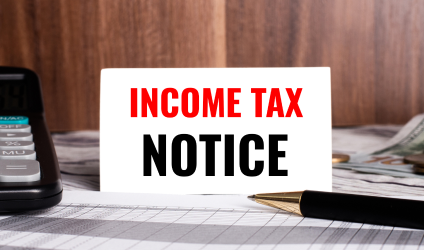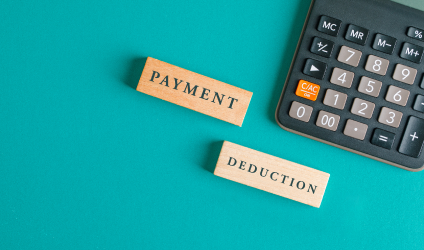Facing an Income Tax Notice? Here's What You Need to Know and How to Respond
In recent times, the Income Tax Department has significantly ramped up its issuance of notices to taxpayers across India. These notices are being sent out for a multitude of reasons, ranging from discrepancies in income disclosure to cases of tax evasion spanning previous years. Other common triggers for these notices include instances of failure to file Income Tax Returns (ITR) within the stipulated time frame, unexpected high-value transactions, and issues related to wrong or incomplete documentation.
Receiving a notice from the Income Tax Department can understandably be a cause of concern and stress for individuals. It often leads to questions about the nature of the notice, the implications it carries, and the necessary steps that need to be taken in response. However, it’s crucial for taxpayers to remain composed and understand that a prompt and appropriate response is key to resolving any issues highlighted in the notice.
In this comprehensive guide, we will delve into the various types of notices or intimations issued by the Income Tax Department. By gaining a clear understanding of these notices and their implications, taxpayers can navigate the process more effectively and ensure compliance with tax regulations.
Types of Income Tax Notices
Notice under Section 143(1):
This is an intimation notice sent after processing your income tax return. It provides details of your income, tax calculation, deductions
Notice under Section 139(9):
If there are errors or discrepancies in your tax return filing, you may receive this notice asking for clarification or rectification.
Notice under Section 142(1):
This notice requires you to provide specific information or documents to the Income Tax Department for assessment purposes.
Notice under Section 148:
This notice is issued if the Income Tax Department believes you have undisclosed income that needs to be assessed
Notice under Section 245
This notice is sent if there are pending tax demands or refunds that need to be adjusted
Understanding Income Tax Notice
The Income Tax Department issues an income tax notice whenever discrepancies are detected between the information provided in your income tax return and data obtained from third-party sources such as sub-registrars, shareholding brokers, or travel records. This notice aims to clarify the reasons behind the discrepancy and requests additional information from you, usually in the form of documents or statements.
Understanding the section under which the notice is issued is crucial as different sections carry varying levels of seriousness. While some notices serve as intimation notices, requiring no immediate action but serving as informational, others demand a response and further follow-up actions.
Upon receiving an income tax notice, it’s advisable to seek guidance from an experienced chartered accountant proficient in handling income tax notices and litigation matters. Notice handling and responding effectively require specialized expertise. After consulting with an expert, you can proceed to provide the necessary information and documents to the Income Tax Department to resolve the issue promptly and accurately.
Receiving a notice from the Income Tax Department can understandably be a cause of concern and stress for individuals. It often leads to questions about the nature of the notice, the implications it carries, and the necessary steps that need to be taken in response. However, it’s crucial for taxpayers to remain composed and understand that a prompt and appropriate response is key to resolving any issues highlighted in the notice.
In this comprehensive guide, we will delve into the various types of notices or intimations issued by the Income Tax Department. By gaining a clear understanding of these notices and their implications, taxpayers can navigate the process more effectively and ensure compliance with tax regulations.
Top 5 Reasons for Receiving an Income Tax Notice Explained
Income and Tax Mismatch
A prevalent reason behind income tax notices is when the income declared in your tax return doesn't align with the data provided by your employer or other sources. This discrepancy can occur due to various factors such as errors in TDS deductions, differences in the salary reported by you and your employer, or missing income details.
The Income Tax Department cross-checks your reported income against the information received from employers and financial institutions to identify any discrepancies. In case of inconsistencies, they may issue an income tax notice to rectify the mismatch.
Non-Disclosed Income
Failure to disclose all sources of income in your tax return can result in receiving an income tax notice. This includes income from interest earned on savings accounts, fixed deposits, rental income, capital gains from investments, or any other form of income that needs to be reported. It's imperative to accurately report and pay taxes on all sources of income to avoid potential notices from the tax department.
High-Value Transactions Monitoring
The Income Tax Department closely monitors high-value transactions such as significant cash deposits, property purchases, stock market investments, etc. If these transactions don't correspond with your reported income or financial status, it may raise red flags and lead to an income tax notice. Maintaining proper documentation and transparently disclosing all high-value transactions in your tax return is essential to avoid any discrepancies that could trigger notices.
Non-Filing of Tax Returns or Late Filing
Failing to file your income tax returns or missing the deadlines set by the tax authorities can also result in receiving an income tax notice. Every individual earning income is required by law to file their tax returns within the specified due date. Failure to do so can lead to penalties, interest charges, and potential notices from the tax department urging compliance.
Incorrect Information in Tax Return
Providing incorrect or inaccurate information in your tax return can be a trigger for income tax notices. This may include inaccuracies in deductions claimed, errors in PAN or Aadhaar details, incorrect bank account information, or any other discrepancies in the information provided.
It's crucial to meticulously review and verify all details before filing your tax return to ensure accuracy and avoid potential notices from the tax authorities. Double-checking the information can help prevent unnecessary complications and ensure smooth tax compliance.
By understanding these common reasons for receiving income tax notices and taking proactive measures to address any potential discrepancies or inaccuracies in your tax filings, you can navigate the taxation system effectively and minimize the risk of receiving notices from the Income Tax Department.
How to Reply to Income Tax Notices?
The recommended procedure for responding to Income Tax Compliance Notices typically begins with seeking expert advice before replying to the notice. Once all details have been carefully considered and discussed, you can proceed with the following steps on the department’s e-filing portal:
Step 1:
Start by logging into the e-filing portal and navigating to the Compliance Portal under the My Log-in menu. Upon confirmation, you will be directed to the compliance portal. Click on the e-verification tab.
Step 2:
Select the view button corresponding to the case you want to respond to.
1. View and Submit My Compliance-
This option allows you to view details about your non-compliance as per department records and any additional information the department requires from you.
- If you have already filed a return despite the notice, choose the first option. You will need to provide details like the settlement number and filing date. For e-filed returns, this information is automatically updated. - If you haven't filed a return, choose the second option and select from four possible responses: - Continuation of return preparation - Closure of business - No taxable income - Other (with a comment if choosing this option)
Step 3:
Once you have entered the necessary information, click Submit to record your response. Similarly, respond to any third-party information requests with 11 available options.
Step 4:
After submitting your reply, the Income Tax Department will review your response. If deemed satisfactory, the case will be closed.
2. View My Submission:
You can monitor the status of your submission on the portal to track actions taken by the IT Department.
This structured approach ensures a systematic and accurate response to Income Tax Compliance Notices, leading to timely resolution of the matter.
Frequently Asked Questions
What should I do if I receive an Income Tax Compliance Notice?
Upon receiving a notice, it's crucial to seek guidance from a tax expert or chartered accountant. They can provide insights into the notice's implications and help formulate an appropriate response.
What are the common reasons for receiving an Income Tax Compliance Notice?
Common reasons include discrepancies in income and taxes paid, non-disclosure of income sources, high-value transactions not matching reported income, late or non-filing of tax returns, and incorrect information in tax returns.
Can I respond to an Income Tax Compliance Notice online?
Yes, you can respond to notices online through the Income Tax Department's e-filing portal. The portal provides options to view the notice details and submit your response electronically.
What information do I need to provide when responding to a Compliance Notice?
You may need to provide details such as settlement numbers, filing dates of returns, reasons for non-compliance (if applicable), and any other information requested in the notice.
How long does it take for the Income Tax Department to review and close a Compliance Notice case?
The time taken for review and closure varies depending on the complexity of the case and the department's workload. Generally, a prompt and accurate response from your end can expedite the process of resolving the notice.
Featured blog

Facing an Income Tax Notice? Here’s What You Need to Know and How to Respond
In recent times, the Income Tax Department has significantly ramped up its issuance of notices to taxpayers across India. These notices are being sent out for a multitude of reasons, ranging from discrepancies in income disclosure to cases of tax evasion spanning previous years.

Startup India Explained: Eligibility, Tax Exemptions, and Incentives
A Startup India initiative taken up by the Indian government is what is normally referred to as a policy by the national government in support of small business enterprises and is owned by the Indian PM Mr. Narendra Modi with the main aim of expanding the country's economy.

Demystifying Income Tax Act’s Section 43B(h): How Deductions for Payments to MSEs Work [FAQs]
Welcome to a deep dive into Section 43B(h) of the Income-tax Act, where we unravel the complexities surrounding deductions for payments to Micro and Small Enterprises (MSEs). Did you know that MSEs play a crucial role in the Indian economy,
Send Message
Contact Information
- 606, 6th Floor, The Spire, Near Ayodhya Chowk, 150 Feet Ring Rd, Rajkot, Gujarat 360006.
- +91 70460 48421
- [email protected]
